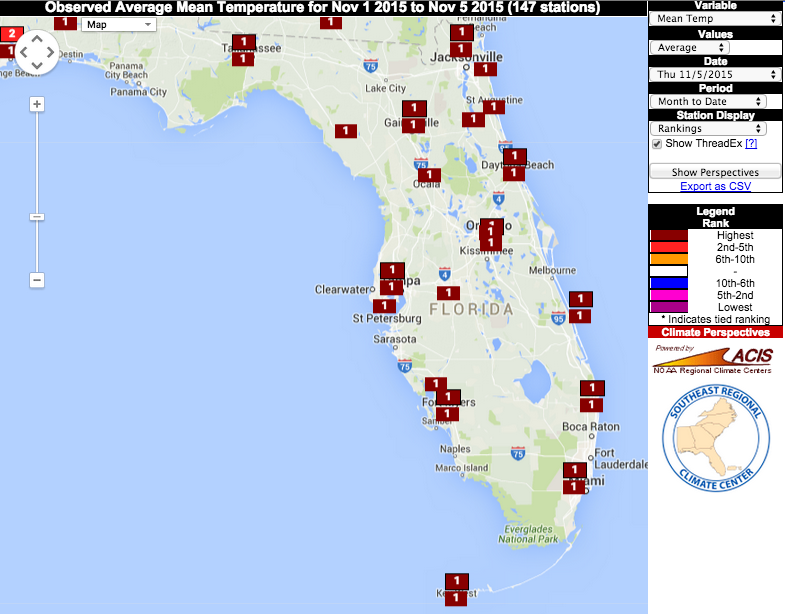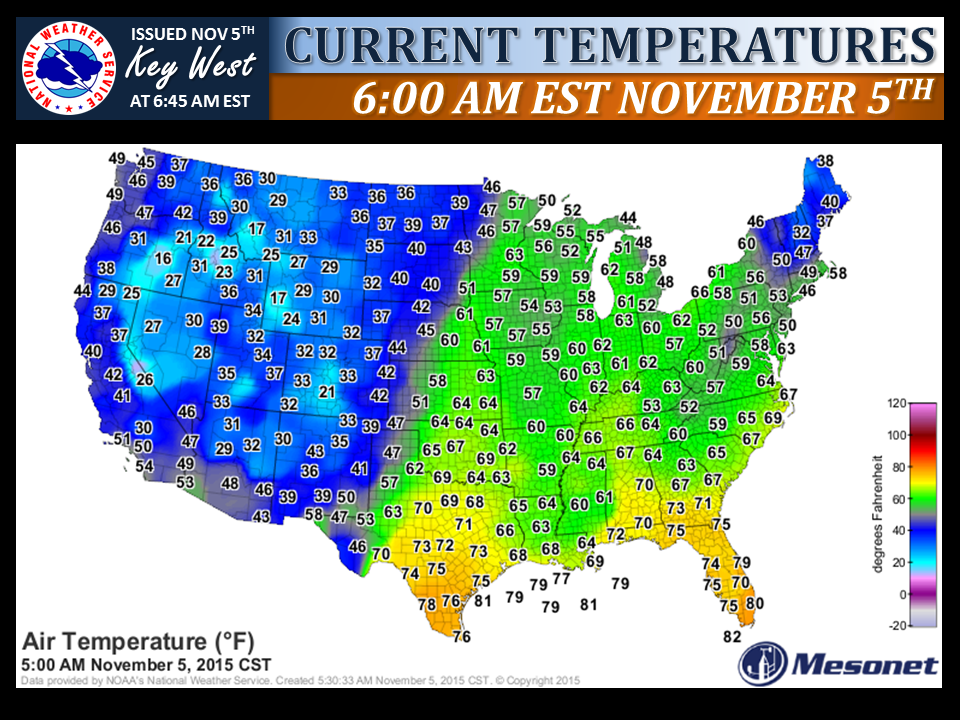Published: November 6,2015
This past week, the following locations have already set or tied records for the month of November:
- Daytona Beach: 90 degrees on Nov. 2 (records date to 1923)
- Gainesville: 91 degrees on Nov. 3 (previous record was set in the Dust Bowl of 1936; records date to 1890)
- Jacksonville: 89 degrees on both Nov. 1 and Nov. 3 (records date to 1871)
- Key West: Low of 81 degrees Nov. 1 and 2 was warmest daily low on record in November (records date to 1871)
- Melbourne: Low of 78 degrees Nov. 5 was warmest daily low on record in November (records date to 1939)
- Naples: 92 degrees on Nov. 4 ties the previous record from 1946 (records date to 1942)
- Tallahassee: 88 degrees Nov. 1, then 89 degrees on Nov. 3 and 4; also tied record warmest daily low temperature of 75 degrees on Nov. 2 (records date to 1896)
- Tampa: 92 degrees on Nov. 4 (records date to 1890)
- Vero Beach: Low of 79 degrees Nov. 4 was warmest daily low on record in November (records date to 1942)
In fact, the hottest temperature anywhere in the U.S. on Nov. 4, often found in the Desert Southwest or South Texas this time of year, was at Cross City, Ft. Myers, Naples and Tampa, each soaring to 92 degrees.
November started impressively warm at Tallahassee, where the first four days of the month marked the warmest four-day stretch in November ever recorded in Tallahassee (80.9 degrees), by a whole four degrees.
Florida's capital city has reached 88 degrees five of the first six days of the month. A high of 88 degrees had only happened on three previous November days in Tallahassee dating to 1896, according to the National Weather Service.
Every #Florida station but 1 (thanks #Pensacola) is having its warmest start to November on record #weather #climate
Typically, beginning in late fall, a succession of cold fronts sweeps southeastward through the Sunshine State, clearing out summer's oppressive humidity.
So far this month, that certainly hasn't happened.
(MORE: Sinkhole Opens in Seffler, Florida)
Dew points, a measure of how much moisture is in the air, have been stuck in the low 70s the past few days, sending heat indices well into the 90s, particularly in South Florida.
This is great weather if you're working on your tan or cooling off in the pool, but pretty miserable if you're in a long line at a theme park.
"It is getting old waiting for Fall to begin in November," said hurricane specialist Eric Blake, based at the National Hurricane Center in Coral Gables, Florida.
Blake says a lower sun angle and a bit cooler temperatures makes the current warm spell in South Florida better than summer, but not by much. "This is the time of the year that (it) usually pays to live in Florida."
This muggy air – yes, we're using the word muggy in November – is also helping to hold morning lows in record warm territory.
Key West finally dipped below 80 degrees Thursday night for the first time since October 30, thanks to a brief shower. They had set record daily warm low temperatures each day, according to Weather Underground weather historian Christopher Burt. No rest for the A/C at night during this heat wave.
As of 6am, with a temp of 82F, #KeyWest was the warmest location in the continental U.S. #flwx #flkeys
The Pattern Behind the Heat
Five-Day Florida Forecast
Relief Ahead
The culprit for this Florida record November heat is a persistent area of high pressure in the upper atmosphere parked from the Bermuda Triangle into the eastern Gulf of Mexico.Conversely, the jet stream has been diverted well north into eastern Canada and northern New England, keeping any cold fronts away from the Sunshine State.
That upper-level high will finally give way later this weekend, allowing the combination of a sagging frontal system from the Deep South and a non-tropical low-pressure system from the Gulf of Mexico early next week to bring an increased chance of thunderstorms.
(FORECAST: Midwest/Northeast Fall Reality Check)
In the meantime, the heat and humidity will persist through the first half of the weekend, with more record highs possible from the state capital of Tallahassee to Naples.
The real relief should arrive by Sunday, with highs mainly in the 70s in north Florida, and low to mid-80s in central Florida, including Orlando and Tampa, with somewhat lower humidity.
South Florida and the Florida Keys should continue to see highs in the mid-80s into next week.
Once the aforementioned low-pressure system clears the state early next week, temperatures should remain near or slightly above average into next week.
NOAA's Climate Prediction Center maintains the warmth in the Sunshine State, and much of the East, into mid-November, based on its latest 8-14 day outlook.
One of Florida's Hottest Years
This recent November heat wave is only the latest chapter in what has been one of the hottest years on record in the Sunshine State.The first nine months of 2015 were the third warmest such period in records dating to 1895, according to a NOAA/NCEI report in September.
If it wasn't for a cold February, 2015 would be in first place already. April through September was Florida's record hottest such "warm season".
According to the Southeast Regional Climate Center, the following Florida cities with periods of record of at least 70 years have had one of their top three warmest years-to-date through November 3:
- Record warmest: Fort Lauderdale, Miami, Moore Haven, St. Petersburg
- Second warmest: Apalachicola, Orlando, Tallahassee, Vero Beach
- Third warmest: Key West, Tampa, West Palm Beach
Fortunately, if you have a vacation planned or are a Florida resident, don't sweat the weather details. There is no sustained bout of colder weather that we can see in the cards at least for the next couple of weeks.




No comments:
Post a Comment